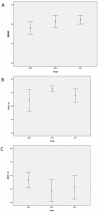Resident Physician Wellness Curriculum: A Study of Efficacy and Satisfaction
- PMID: 31592369
- PMCID: PMC6773458
- DOI: 10.7759/cureus.5314
Resident Physician Wellness Curriculum: A Study of Efficacy and Satisfaction
Abstract
Background Recent literature highlights the alarming prevalence of burnout, depression, and illness during residency training; a trend that is also linked to suboptimal patient care. Dedicated wellness curricula may be one solution to this concerning issue. Purpose To determine the effect of a multi-faceted wellness curriculum during emergency medicine residency training on wellness scores and to assess resident satisfaction with the program. Methods This study was conducted via a longitudinal survey. In 2009, a faculty-derived resident wellness curriculum (F-RWC) was initiated. This program was then bolstered with a parallel resident-derived curriculum (R-RWC) one year later, in 2010. Emergency medicine residents were surveyed in 2009, 2010, and 2011 to assess wellness at baseline, after one year of the F-RWC, and after one year of combined RWCs, respectively. Surveys included two validated assessment instruments (the Brief Resident Wellness Profile (BRWP) and the SF-8TM Health Survey), a satisfaction Likert scale, and a demographics information sheet. Results The survey response rates were 89% (n=17), 100% (n=17), and 83% (n=24) from 2009, 2010, and 2011, respectively, for a total of 58 participants. From baseline in 2009, there was a significant improvement in resident wellness, with the addition of parallel RWC by 2011, as measured by the BRWP (p=0.024). The faces scale, a subset of the BRWP, showed a trend toward benefit but did not reach statistical significance (p=0.085). There was no evidence of a statistically significant change in SF-8TM scores over time. Participants consistently reported positive satisfaction scores with RWC initiatives. Conclusions Dedicated RWC, with input from both faculty and resident physicians, improved wellness during residency training with a high degree of participant satisfaction. Such programs are needed to support resident physicians during their training.
Keywords: physician burnout; physician well-being; resident curriculum; resident training; resident wellness; wellness.
Copyright © 2019, Lefebvre et al.
Conflict of interest statement
The authors have declared that no competing interests exist.
Figures



References
-
- Wood RJ, eds. Evaluating Stress: A Book of Resources. Lanham, Md: Rowman & Littlefield Publishers Inc. Vol. 191. New York: Scarecrow Press; 1997. Evaluating Stress: A Book of Resources, Third Edition; p. 218.
-
- Anxiety and depression in the first year of medical residency training. Peterlini M, Tiberio IF, Saadeh A, Pereira JCR, Martins MA. Med Educ. 2002;36:66–72. - PubMed
-
- Evolution of sleep quantity, sleep deprivation, mood disturbances, empathy, and burnout among interns. Rosen IM, Gimotty PA, Shea JA, Bellini L. Acad Med. 2006;81:82–85. - PubMed
-
- Manitoba suicides force consideration of stresses facing medical residents. Williams LS. https://www.ncbi.nlm.nih.gov/pmc/articles/PMC1227505/ CMAJ. 1997;156:1599–1602. - PMC - PubMed
-
- House staff well-being. Koran LM, Litt IF. https://www.ncbi.nlm.nih.gov/pmc/articles/PMC1026039/ West J Med. 1988;148:97–101. - PMC - PubMed
LinkOut - more resources
Full Text Sources
